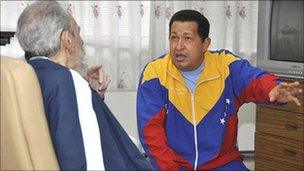Chavez's health: Venezuelan views
- Published

Venezuela's President Chavez with Cuba's revolutionary leader Fidel Castro
Venezuela's army has dismissed concerns about political instability in the country after President Hugo Chavez's admission that he had cancer surgery.
Army chief, Gen Henry Rangel Silva, said Mr Chavez, who remains in Cuba after the operation, was "getting better" and was still in charge.
But Mr Chavez's opponents question his ability to run Venezuela from abroad.
BBC News website readers in Venezuela have been sharing their views on the situation in their country.
Carlos Morreo, Caracas
I'm generally a supporter of the government, but I was surprised that Mr Chavez didn't tell us for so long about his stay in Cuba.
I think we should follow the constitution in that a vice-president should take charge in Mr Chavez's absence.
He has always been president, apart from the coup in April 2002. So appointing someone to take his place, even for a couple of days, may not be the right move to make.
The government has not gone the right way on this issue with statements such as the one saying Mr Chavez can govern from anywhere and that he is capable.
I think many people believe Mr Chavez but some are still anxious about what the future holds; the longer he stays away in Cuba, the greater the uncertainty in Venezuela.
Mr Chavez has been a strong leader. He is a strategic thinker who has outwitted his opposition for years. But his health has outsmarted him - he has done little to plan what will happen if he falls ill.
Suddenly, those of us on the Venezuelan Left are forced to think about, and perhaps may even need to pursue a kind of progressive politics that cannot depend on the charisma and presidency of one man.
Yet, at the same time, my more realistic analysis tells me that I should be worried about those within the PSUV (Chavez's party) who may wish to take this opportunity to take control and position themselves as likely leaders.
The truth of the matter is that within the higher echelons of the Chavista movement there is nobody capable of keeping together the disparate forces and interests that Mr Chavez has coalesced around him over the years.
Lots of good things have come about under Mr Chavez's leadership since 1999 but there is a lot in terms of social organisation that needs to be done.
I am unhappy about Mr Chavez's health but it is an opportunity for the country to move away from centralised leadership.
Next year there will be presidential elections. These are tricky times indeed.
Maria Gonzalez, Barquisimeto
As for many Venezuelans, I believe it is not acceptable that Mr Chavez insists on running the country from Cuba.
From the inside, it looks like his bureau of ministers and even the vice-president of the country are not authorised to address the different issues taking place right now.
They all seem to be waiting for Mr Chavez's instructions on issues such as the current energy crisis and the rebellion of the prisoners at the Rodeo Penitentiary, just to name a few.
The vice-president could be commissioned to occupy the presidential seat while Mr Chavez continues to recover.
But the fact that the information about his poor health had been kept confidential for all this time, as well as the contradictory declarations offered by his bureau of ministers, give Venezuelans a sour feeling of uncertainty.
We lack the confidence that there is anybody in his cabinet who is able to run the country.
All things being equal, supporters and opposers to Chavez's regime hope he gets well soon, and that things do not go worse.
Sebastian, Caracas
As a Venezuelan, I think Mr Chavez is a very clever person and almost every move he makes is a winning point to his legacy.
Twelve years on and people love him very much especially now he is showing a human side.
He has woken us up and all Venezuelans are alive now.
I got fed up with the political situation because Mr Chavez has people around him who are not very helpful to the country - some of them are trying to take advantage at every opportunity.
Let's see what happens now. I hope we Venezuelan people become more positive and stop fighting each other for no reason.
Respect is the key - tolerance is the way forward.
- Published1 July 2011